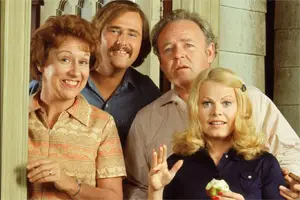All in the Family turns 50: Why the Norman Lear sitcom was so radical for 1971
-

Norman Lear, who with Bud Yorkin pitched the working-class comedy based on British sitcom Till Death Us Do Part to CBS, wrote in his autobiography that before his groundbreaking sitcom's debut on Jan. 12, 1971, "TV comedy was telling us there was no hunger in America, we had no racial discrimination, there was no unemployment or inflation, no war, no drugs, and the citizenry was happy with whomever happened to be in the White House.” In fact, there was a profound gap between real life and what was depicted on TV, says Tim Gray. "The set of the Bunkers living room, designed by Don Roberts, had one small but important detail: There was a TV set," says Gray. "Most Americans arranged their furniture around the television, but very few sitcom families had that all-important piece of furniture. In addition, AITF viewers heard the sound of a toilet flushing, which was groundbreaking for a series. These may not seem significant, but they served notice to viewers at home: This family may be fictional, but they live in the same world as you do. They’re closer to reality than the families you’re used to seeing. That was the reason for CBS’s fears, and that was the reason why audiences embraced the show."
ALSO:
- All in the Family's premiere episode tackled a range of issues right away: "It discussed atheism, with Michael and Gloria explaining they have found no evidence of god," says Tony Sokol. "The family dissects affirmative action, with Archie asserting everyone has an equal chance to advance if they 'hustle for it like I done.' He says he didn’t have millions of people marching for him to get his job, like Black Americans. 'His uncle got it for him,' Edith explains, with an off-the-cuff delivery exemplifying why Stapleton is one of the all-time great comic character actors. The family argues socialism, anti-Semitism, sausage links and sausage patties. The generation gap widens as Archie wonders why men’s hair is now down to there, while Gloria’s skirt got so high 'all the mystery disappears' when she sits down. All in the Family would continue to deal with taboo topics like the gay rights movement, divorce, breast cancer, and rape. Future episodes would question why presidential campaign funds are unequal, how tax breaks for corporations kill the middle class, and weigh the personal price of serving in an unpopular war as opposed to dodging the draft."
- From Maude to The Jeffersons, All in the Family spawned the most spinoffs of any sitcom
TOPICS: All in the Family, Norman Lear, Retro TV
More All in the Family on Primetimer:
